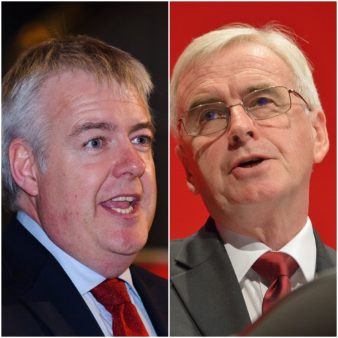Wales and John McDonnell’s ‘radical federal UK’
11 January 2017
As John McDonnell calls for a ‘radical federal UK’ in order to strengthen Labour’s position in Scotland, Nye Davies explores the implications for Wales and the tensions arising from different strands of the party.
Shadow Chancellor John McDonnell has called for a “radical federal” UK in a recent interview with The Herald, marking a change of policy for the Labour Party. McDonnell’s calls have come amid renewed talk of a potential second referendum on Scottish independence and Labour’s attempt to win back supporters in Scotland in light of the party falling further and further behind in one of its former heartlands. Labour is losing ground to the Tories in the constitutional debate in Scotland and needs to offer a convincing argument to the Scottish people in order to win back support. But where does Wales fit in to this plan? Considering calls for federalism from Welsh Labour have been ignored in the past, it is questionable whether the implications on Wales have been thought through.
Welsh Labour Leader and First Minister Carwyn Jones has been calling for a “constitutional convention” for a few years, but as noted by David Moon in 2014 when Ed Miliband was leader, it largely fell on deaf ears within the Labour Party hierarchy. In a speech in 2014 Carwyn Jones called for federalism in order to enable “unity while guaranteeing diversity” and to strike “the best balance between national citizenship and local flexibility”. His calls have become stronger since the Brexit vote due to talk of a second Scottish independence referendum. A federal UK would mean Wales would not be “an annexe to England…We don’t have to have independence – there is a way to ensure there is some sort of federation, or some sort of agreement”. Maybe Carwyn Jones has finally got through to John McDonnell and Jeremy Corbyn; but it is more than likely that this move is a way to win back Scotland to the Labour Party cause.
If the Labour Party is to adopt this policy, it must settle the key issues of what federalism entails: the makeup and size of the different parliaments, how a second chamber would work, the role of current MPs in Parliament. All these issues and more need to be considered. Perhaps more important would be the financial implications of such a federal UK state: how would funding for each nation be decided? How will the size of England compared to Wales, for example, be resolved? Plans may be revealed in time, but for now we’re left with simply expecting Labour to adopt the policy of a ‘radical’ federal UK, whatever that will look like.
Whatever form is suggested, tensions between the Parliamentary and Welsh Labour Parties need to be settled. While Carwyn Jones and many of his colleagues in the Welsh Labour group in the National Assembly have called for a federal UK, and a federal structure to the party for that matter, Welsh Labour MPs have been hostile to such changes. Their position would be in question if federalism were to occur as it is not yet clear if they will keep their jobs.
There is also confusion over whether the Parliamentary Labour Party and Welsh Labour have the same objectives in mind. As Professor Richard Wyn Jones asked, if the policy of the Labour Party is for there to be a federal UK, why are Labour opposed to the establishment of a Welsh legal jurisdiction? The Welsh Government has called for a distinct jurisdiction yet Labour MPs didn’t support it when the Wales Bill passed through Parliament.
All of this shows that different parts of the Labour Party do not seem to be operating on the same wavelength. Carwyn Jones’ calls for federalism and a distinct legal jurisdiction have been ignored in the past but suddenly this call seems to be developing as party policy. What form it will take remains to be seen. Whether it can gain the support of all Labour MPs, unlike many of the current Corbyn leadership’s policies, also remains to be seen.
Talk of a federal UK and a discussion on the UK constitution from the Labour Party leadership is welcome. But for Labour to take this forward, everyone needs to be singing from the same hymn sheet; and a Welsh voice should not be lost in the choir.
Comments
2 comments
Comments are closed.
- June 2024
- December 2023
- November 2023
- August 2023
- February 2023
- December 2022
- November 2022
- September 2022
- July 2022
- April 2022
- March 2022
- January 2022
- October 2021
- July 2021
- May 2021
- March 2021
- January 2021
- November 2020
- October 2020
- August 2020
- July 2020
- June 2020
- May 2020
- April 2020
- March 2020
- October 2019
- September 2019
- June 2019
- April 2019
- March 2019
- February 2019
- December 2018
- October 2018
- July 2018
- June 2018
- April 2018
- December 2017
- October 2017
- July 2017
- June 2017
- May 2017
- April 2017
- March 2017
- February 2017
- January 2017
- December 2016
- November 2016
- October 2016
- September 2016
- Bevan and Wales
- Big Data
- Brexit
- British Politics
- Constitution
- Covid-19
- Devolution
- Elections
- EU
- Finance
- Gender
- History
- Housing
- Introduction
- Justice
- Labour Party
- Law
- Local Government
- Media
- National Assembly
- Plaid Cymru
- Prisons
- Rugby
- Theory
- Uncategorized
- Welsh Conservatives
- Welsh Election 2016
- Welsh Elections
Mae yn hen bryd symud ymlaen gyda hyn, cyn bod y sefyllfa yn gwaethygu gyda phroblemau brexit.